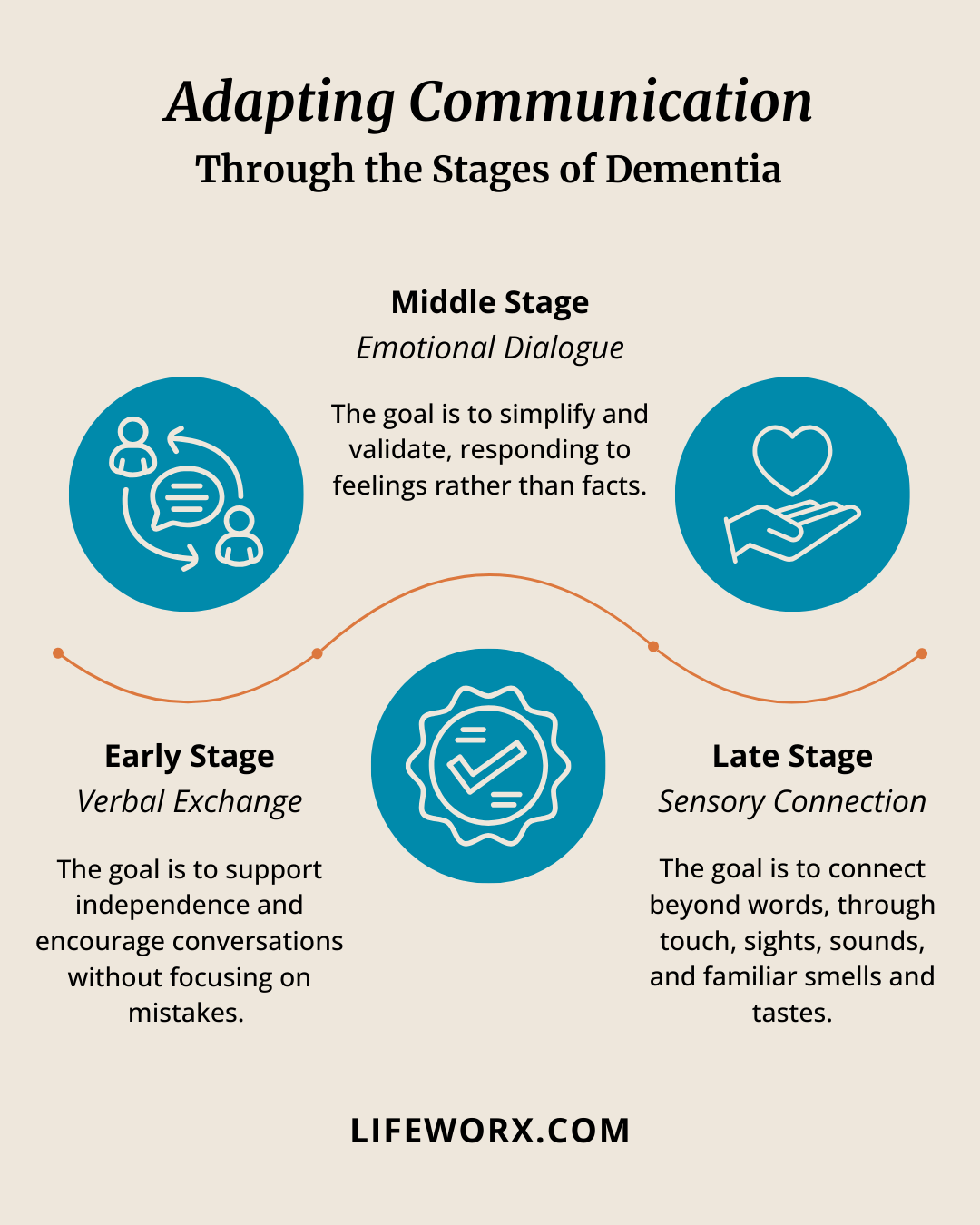
Adapting Communication Across the Stages of Dementia
Key Takeaways
- Communication shifts as dementia progresses, starting with subtle changes and ending with non-verbal connection.
- People with dementia still respond to tone, rhythm, and presence, even when words become difficult.
- In later stages, connection relies on touch, music, and shared sensory experiences rather than spoken language.
When someone we love is diagnosed with dementia, the way we talk to them may begin to shift in subtle, often challenging ways. The level of difficulty with conversation can vary based on the stage of the disease. At first, it might just be forgetting a word or repeatedly asking the same question. Later conversations may become confusing, and eventually, words may fade completely.
While dementia alters how communication works, it doesn’t diminish the need or ability to connect. Research indicates that individuals with dementia continue to respond to tone, rhythm, and presence. By adjusting how we communicate, we can continue to share moments of connection with our loved ones.
Early-stage dementia
In the early stages of dementia, changes in communication may be subtle and can often be mistaken for typical signs of aging. Your loved one might repeat questions or lose track of their thoughts. They may be aware of these memory lapses and attempt to cover them up with humor, become frustrated when corrected, or withdraw from the conversation.
Here are some things that can help in this stage:
- Speak at a relaxed pace and minimize distractions such as the television and background noise.
- Address your loved one directly and use names instead of pronouns. For example, say, “We’re having lunch with your brother, James,” instead of “We’re having lunch with him.”
- Continue to include your loved one in group conversations. Even if they contribute less, give them time to respond.
What matters most is helping your loved one feel included and respected. As a family member or caregiver, you can play a significant role in maintaining their dignity. Continue treating them as a full participant in conversations. Ask their opinion, tell them stories, and share a laugh together.
Middle-stage dementia
As dementia progresses, words become harder to find, and sentences become shorter. It’ll become important to simplify conversations by using concise and straightforward sentences. Additionally, individuals may experience heightened emotional sensitivity at this stage, making the tone of your voice just as important as the words you use.
Families often find it useful to:
- Break down tasks into simple, step-by-step instructions
- Pair words with gestures or demonstrations, like pointing to a chair when asking them to sit
- Use family photos, calendars with notes, or labeled items to minimize confusion
- Offer choices and ask close-ended questions instead of open-ended ones
Family members and caregivers may need to learn how to respond to the emotions beneath the words, rather than to the words alone. For instance, if a loved one with dementia insists that they need to pick up their children from school, even though their children are now adults, responding by correcting them may cause distress. Instead, acknowledge their feelings and gently redirect the conversation. This approach respects their reality without contradicting them.
Later-stage dementia
In the late stages of dementia, when verbal communication may disappear, non-verbal cues become the primary mode of communication.
Physical touch can play a crucial role in maintaining the bond. Holding hands, sitting together, or stroking their hair can provide comfort just as effectively as words. Music can also reach individuals even when language fails. Research shows that the parts of the brain associated with emotion and music remain resilient as dementia progresses, which is why someone struggling to express themselves may still smile or tap their foot to their favorite song.
Here are some ways to connect during this stage:
- Use touch, sights, sounds, and familiar smells and tastes to create comfort
- Pay attention to body movements, facial expressions, or sounds as forms of communication
- Speak slowly and clearly in a gentle tone
Visiting a loved one in the late stages of dementia may no longer involve conversation. Instead, focus on holding their hand, making eye contact, and finding alternative ways to bond, such as humming their favorite song.

Dementia reshapes the way families interact. One of the first things to change is how we communicate with the person we love. For families and caregivers, it’s important to lean into new forms of expression. With adaptation and patience, communication can keep loved ones feeling connected and comfortable at every stage.
In addition to changes in communication, individuals with Alzheimer’s and other related dementias will eventually require assistance with daily tasks. LifeWorx caregivers are experienced in supporting individuals living with dementia and are equipped to navigate the changes in memory, personality, and behavior that accompany it. Contact our team today to learn more about our services.

















